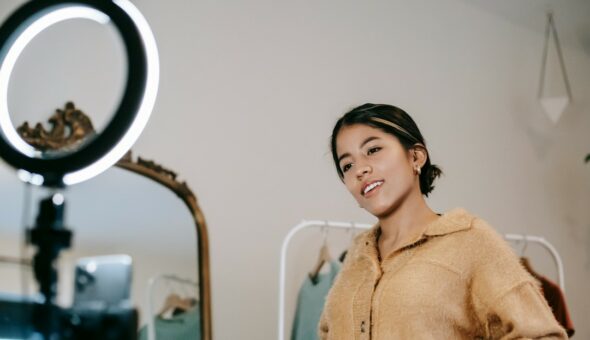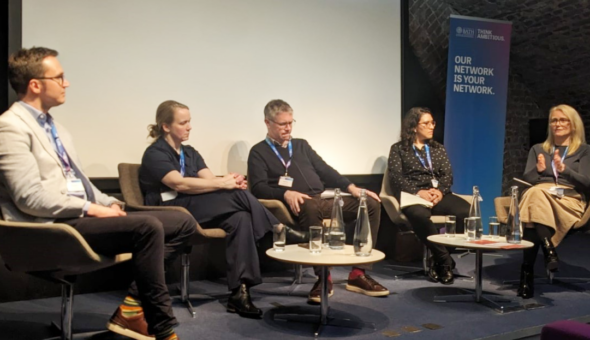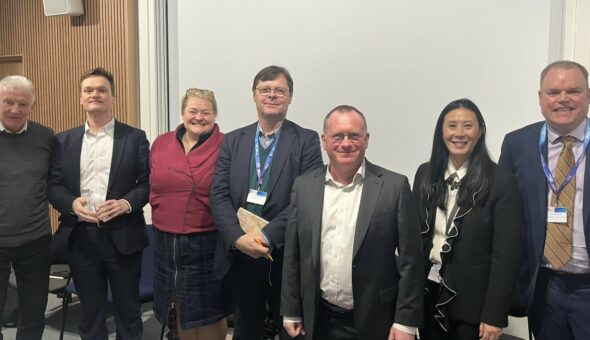Professor Stephen Brammer is the newly appointment Dean of the School of Management. We sat down with him to discuss how his interest in Business and Society issues began, his top tips for maintaining research output, and why he's so proud to have returned to the University of Bath.
You’ve recently re-joined Bath as Dean of the School of Management. Can you speak about your path to the role?
I started my career in Bath – I was here for twelve years or so and had a wonderful time. So, when I came to apply for the job of Dean, I had a deep sense of the school's DNA and I knew how exceptional it was. We have research excellence across the board and the quality of the academic and professional staff is exceptional. The students are wonderful, and so are our programs. I strongly believe in the School community, so I feel privileged to be back here leading them.
I started out as an industrial organisation economist. My undergrad, Masters and PhD were in Economics. Having done my PhD, I joined the School of Management as a teaching fellow in Business Economics. You might wonder why I joined a Management School, rather than a social science or economics school where I’d done my education. It’s because I was searching for something meaningful. I wanted to do something that I found interesting and exciting, but also where I had the capacity to contribute and advance understanding.
And while I was struggling to see a future for myself as an industrial economist, it did help steer me towards an interest in business and society. During my degrees, I became interested in firms in industries. I started looking at what different firm level data I could access from different databases across the world. Through this, I noticed something that I thought was absolutely fascinating, which was that there was a disclosure requirement in UK company law for firms to divulge political and charitable donations.
So, the first step on my road to an interest in the role of businesses in society, corporate responsibility, corporate citizenship, sustainability, environmental management and so on, came from a desire to understand more about corporate philanthropy. It just struck me as such an odd thing that a profit-oriented business would seek to give away money A lot of my early work explored this because I wanted to understand what this was all about, and what the impacts of it were.
My foot in the door at Bath was doing work on corporate philanthropy with some colleagues here. And then I was co-opted into the world of business and society through this involvement with this work I was doing. One of the things that's striking about research in this area is that you don't remain scientifically neutral for long. This isn't the kind of work you do because you are this objective outsider to the phenomenon. Quite quickly the research and phenomena that you engage with affects you emotionally, and you come to care about it.
After this, I progressed to senior lecturer and then professor, and then I founded a Research Centre, took on several leadership roles in the in the school. And then there came a time when I asked myself would it be a good thing if I spent my entire career at Bath? One answer to that question is “absolutely” - it's a wonderful place to live and work, and I’ve got great colleagues. But there was a part of me that that felt like it might be valuable to experience other things. And an opportunity came along to go to Warwick Business School as Associate Dean for Research, and following that I was Associate Dean for faculty at Birmingham Business School where I ran their strategy and international business department.
By this point in my career, I’d had a lot of leadership roles but I hadn’t run a School. So when I got the opportunity to go and run a very big school in Australia, I was really excited. Not not only because it’s was a bit of adventure but because it was an organisation on a completely different scale to anything I’d dealt with before. Macquarie was a school of 17,000 students - a breathtakingly different scale of operation. I was an executive Dean, which gave me a lot of autonomy and strategic responsibility– I led major organisational change successfully, so it taught me a lot.
But then came a hankering for home. After about three and a half years in Australia we started to miss the UK, and around the same time there was a vacancy here. It felt like fate!
Since the first of June I’ve been back here, and it’s been wonderful. While COVID had made everything very strange, it’s also been fascinating, and the experience has fed into my research interests. I have a genuine interest in the way that a massive shock event like COVID shapes many of the same issues to do with business and society that I'd spend lots of my career engaging with.
You’ve published extensively, with many papers coming out in recent month. How do you plan to approach research with so many demands on your time as Dean?
I absolutely plan to keep doing research. I think that’s really important. I believe it’s important for Deans to continue to engage as much as they can in the full academic life of a school. I think it's valuable in leadership to model the behaviours that you're expecting of others - to be in a position where you are experiencing some of what your colleagues are experiencing in order to understand and identify with them.
I'm probably as or more research active now than I was at any point in the last five years. And some of that is because I’ve worked on how to crack the code of doing it. This code is centered on work life balance. I don't work weekends, I don't work evenings - I try not to think about work when I'm not doing it. I think it's extraordinarily important that we protect that time to look after ourselves and to live a rounded and balanced life.
So, I asked myself – as a busy person with many calls on their time, like most academics - how do you go about sustaining a level of research activity that helps you feel intellectually stimulated, but also productive and an engaged? I thought about that a great deal and I came up with an answer that then I began to practice. My approach rests on three things.
First of all, collaboration. It’s important to understand that you don’t have to personally do every piece of the research project to have ownership over the ideas. If you can identify good collaborators, then not only will you enjoy doing it more but it will keep you continuously active and engaged. It was great when I was working in Australia, collaborating with people here – they would work on something while you’re asleep, it would be in your inbox in the morning, and then you work on it and ping it back.
The second thing is professionalisation. There are various elements of the research process that one can seek professional help with. I used Air Tasker a bit, for example, to get help with tasks like downloading and collating the PDFs needed for a literature review. I'm a big fan of professional copy editing - even if you think your English is fabulous, getting your papers a last polish is really important.
The third one is to focus on one thing at a time. I call it ‘doing sprints’. I devote all of my attention and focus on one thing for a short period of time. When I’m doing a sprint, I'll try and take an idea from genesis to first draft in two weeks. You set aside some evenings and maybe some time at the weekend in a concentrated period to do that. You throw all your extra energy and time for a fortnight into it, and you get a big boost forward with that single piece of work. Then you don't do that for a while because work life balance is important!
So there's a set of tricks that you can use to help ensure your continued engagement and success of your research. If you use them, I think you can do justice to other things in your life but continue to be excited about, and progress in your research.
You’ve produced a lot of research lately about Covid 19. Is that because it was something that interested you, or was it a case of necessity – that you were trying to find a solution to a problem facing organisations and society?
I think a little bit of both. There are a few supply side and demand side factors in this. Fundamentally, I research things that interest me. There’s no denying that the pandemic is having profound impacts across a broad range of things - from workplaces and the future of work, to globalisation and changes in international relations, to the shift in the contract between business and society. So, I had a definite intellectual interest that I wanted to explore.
The other part of it, though, is that the organisations and representative bodies had questions that needed to be answered. For example, we have a number of projects at the moment that look at employee and human resource manager/manager experiences of COVID in a range of organisational settings. They’re really about how individuals and managers deal with the complexity of this situation, and how organisations try and support employees in various situations while dealing with this uncertainty. There’s a huge appetite for that sort of work at the moment.
So, on one level it’s about construing oneself as a sort of interested, engaged research citizen of the world. And in another sense being directly responsive to some of the needs of organisations and wider society.
You founded CBOS, along with several other research centres. What would you say is the value of these forums? And what has changed since you first founded it?
I believe very much in the importance of forums and environments that bring people with similar interests together. And that's partly to that point, about collaboration I made. One of the most powerful and central parts of my experience when I was first at Bath was the fact that we had such critical mass in the field of Business and Society within the school. It helps you support one another in such a unique way – you can share ideas, data, insight about theory and methods and so on that are very particular to the kinds of phenomena and issues that you're exploring.
I think there's no doubt that CBOS has prospered intellectually over the last 10 years. The leadership now is doing a fabulous job, and we've recruited some sensational colleagues. In terms of the topics, and range of issues that folks are investigating, I think that is a little different. There are some similar concerns around sustainability but certainly, it’s broadened – there are now people from across many divisions. I think one of the things that's exciting is that the breadth of the community has increased in a way that is really exciting and reflects that open inclusive leadership that I think is key to its success. I'm glad to be back. And I'm glad to be collaborating with folks. And hopefully, I can continue to bring continue to bring something to that to that research environment!
What are you most proud of in your career?
That’s really hard to say. I've had a really varied career and that’s what I like about it, but it makes it hard to choose one thing – I think it’s in my nature to enjoy leading, but also I find such value in teaching and mentorship. Not to mention research!
I think one thing that leaders don't reflect on enough is the privilege of being given the trust of an organisation and the community. That's something I value extraordinarily highly. So, you could say I’m really proud of that. The School of Management community got to choose whether I came back and they decided to put their trust in me. I’m incredibly grateful for the support and engagement of my colleagues in the School and the sort of acknowledgment of our shared values.
Who in your career has inspired you?
I've been extraordinarily lucky in my career to have worked with some incredible people who gave me amazing opportunities. My successes as an academic, as a Dean and an educator are due to the support and guidance I’ve received from others. That’s part of the reason I believe so much in mentorship.
If I think back to the start of my career, people like Tim Wakeley and Bruce Rayton welcomed and befriended me and really helped me get my foot on the ladder and understand how everything worked. In particular they helped me with teaching – sharing their slides and so on.
In terms of research, the values I hold and the approach that I take are the ones that Andrew Millington mentored me in. He was head of our group - he and I were collaborators for a long time and shared a friendship as well as a professional relationship. He was and still is a wise counsel and almost single handedly taught me what research quality is.
These are very shrewd, experienced academics who passed on that wisdom of how to make your way in this world. And as an early career researcher everybody needs somebody to help them make sense of the environment they're in. The support that I was given makes me determined to be that person to others. I take that seriously, and see it as a privilege.
I think that the acid test of any academic environment is its capacity to attract and develop. We’re lucky that we have a lot of people in Bath who are here for the long run. But I’m equally proud that we can start people off in their careers – through mentoring and collaboration and support – that then go on to all sorts of amazing organisations around the world.
If you weren't an academic, what would you be?
Oh, that's a really, really tough question. I can think of no other thing, that I would be a fifth as good as I am at this. It would be a very strange world for me if I wasn't in academia. And the funny thing is, I sort of fell into it. When I was in school, I wouldn’t have been able to tell you what a PhD is. I didn't come from an academic family – no one had been to university in the family before, in a proper sense. So, I still feel like the luckiest person in the world because, through a kind of meandering, primrose path, I found myself an absolute dream career. I’m very thankful and mindful of that every day, because being an academic is in my DNA.
As academics, we always see things that could be improved - and frankly, they're often things we are right to think could and should be done better. But the reality is, we should also reflect on the fact that we are extremely lucky to be doing lots of what we do. We hold very trusted and privileged positions in society that are also just a lot of fun. So I try and keep that sense of perspective, particularly through what we are going through at the moment.
Respond



